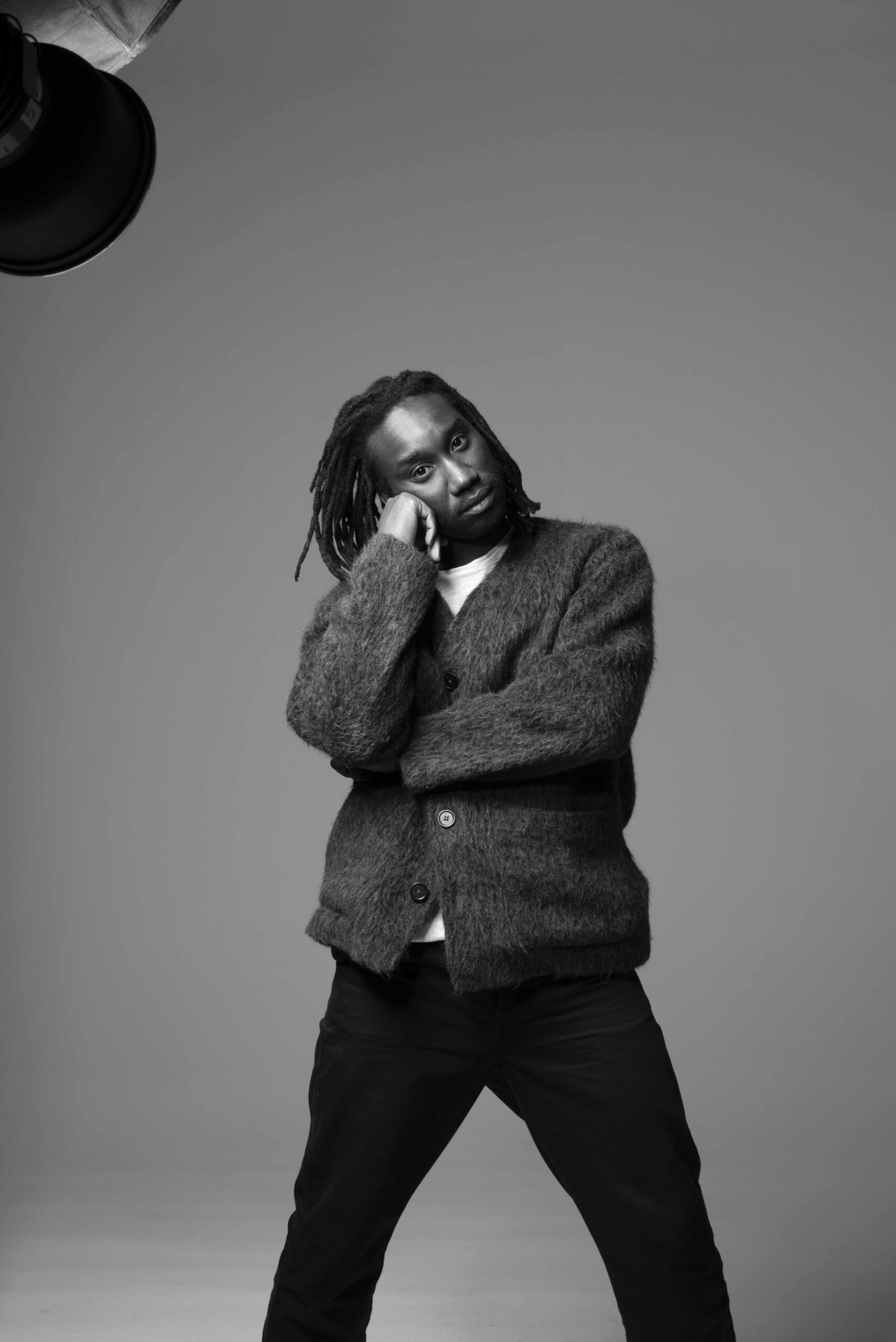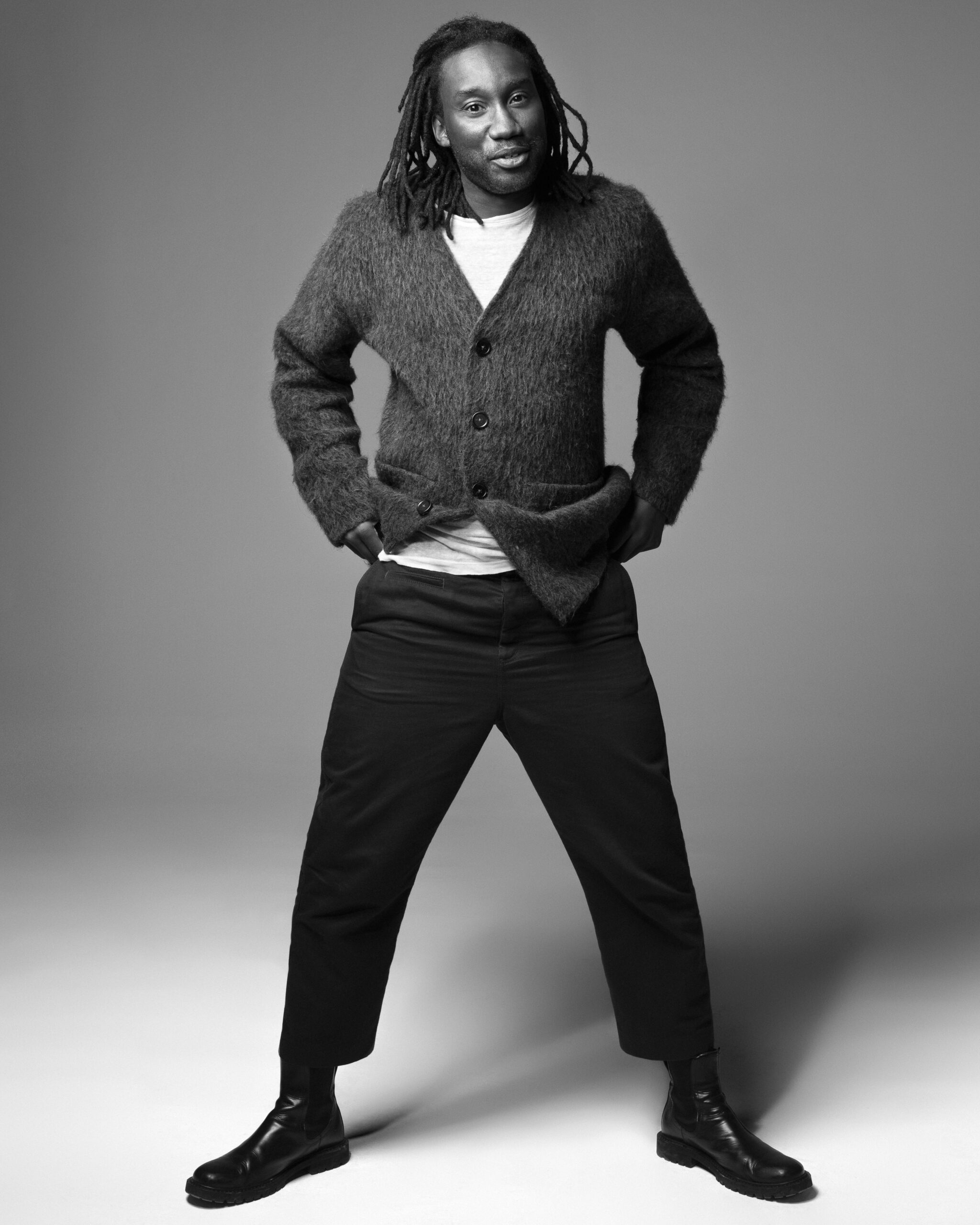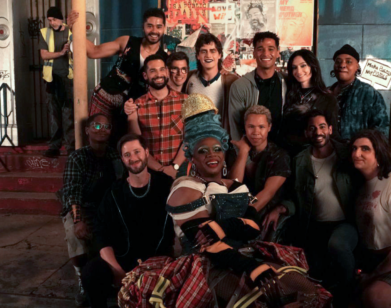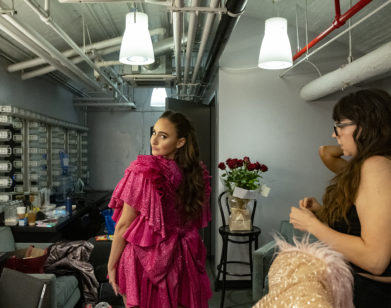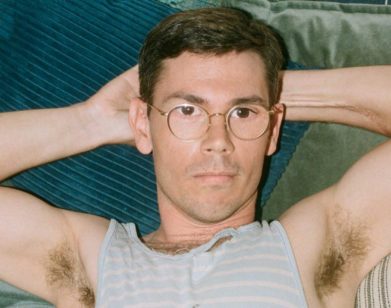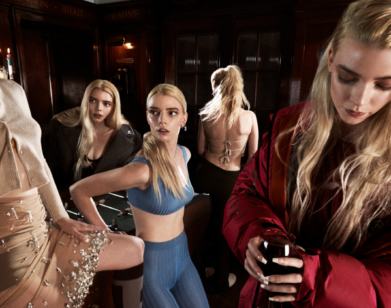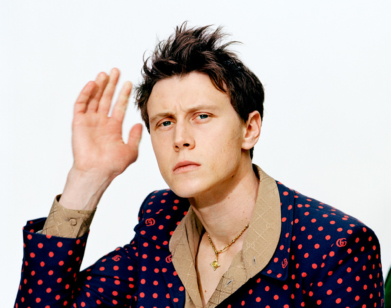IN CONVERSATION
Nathan Stewart-Jarrett Is More Than Just the Guy With a Clipboard
Femme, the erotic psychodrama from directors Sam H. Freeman and Ng Choon Ping, might seem, at first glance, to be retreading familiar territory. Right from the jump, Jules, a drag artist at an East London nightclub brought to life by the 38-year-old Nathan Stewart-Jarrett, is viciously attacked by Preston, played by George MacKay with the particular menace of someone who’s severely repressed. But this isn’t just another movie where a gay guy gets hate-crimed. “I’ve seen many gay people live, laugh, and love on screen,” says Stewart-Jarrett. “They just always die at the end.” Femme, buoyed by its unsettling plot and the electric chemistry between its two leads, puts a new spin on a well-worn genre and refuses to condescend to its audience. “I wanted that nuance and I wanted it to be muddy,” Stewart-Jarrett told the actor and writer Ryan O’Connell, who knows a thing or two about how hard it is to get a fresh, subversive queer narrative green-lit in Tinseltown. “I really fucking hate things that are spoon-fed.” Shortly after the film’s wide release, the two got on Zoom to have a wide-ranging conversation about intimacy coordination, gay guys holding clipbaords, and falling down a YouTube rabbit hole.
———
RYAN O’CONNELL: Where are you Zooming from?
NATHAN STEWART-JARRETT: I’m Zooming from New York. I’m right by my window in my white, dark, East-facing apartment.
O’CONNELL: You’re bathed in light. Honey, you’re literally sun-drenched. And I’m in a windowless room.
STEWART-JARRETT: It’s quite dark in here. I’m literally licking the window right now.
O’CONNELL: The drama of this all. I watched Femme yesterday and I’m fully obsessed.
STEWART-JARRETT: You are? You’re on board?
O’CONNELL: I’m going to be honest with you. I was initially a little bit TBD because I read “hate crime” in the log line and I was like, “Oh, here we go again. Another gay guy getting beaten with a baseball bat.” And I have, as I’m sure you do as well, an allergy to that, because I feel like when it comes to queer people in media, our value is inherently tied to our trauma. If we’re not being traumatized over and over again, no one cares. No one wants to see gay people living, laughing, and loving.
STEWART-JARRETT: I’ve seen many gay people live, laugh, and love on screen. They just always die at the end.
O’CONNELL: Totally. It’s a fun little surprise. But in Femme, you get the hate crime out of the way right up top. Then it turns into a strange erotic thriller, a game of cat and mouse and constantly shifting power dynamics. I had never seen anything quite like it. I thought the journey that your character Jules goes on was so interesting. It’s very plainly stated: he wants revenge and he’s going to get it. But then it becomes much more complicated than that. Is that how you saw it?
STEWART-JARRETT: Yeah, that was why he was attracted to him in the script. It’s not evident in the script that Jules becomes compromised emotionally, and I really wanted to amplify that. I don’t just think gay people just eroticize the bully. A family member of mine actually got bullied by someone at work in a really awful way, and they could not stop talking about this person. So it becomes your focus, this thing that’s oppressing you, and you obsess over it because you have no other choice but to obsess over it. I’ve had stuff happen to me in New York that’s stayed with me for a long time. Something as big as being physically attacked can imprint on you and stay with you forever.
O’CONNELL: It just felt very nuanced and it did not hit you over the head, to use typical hate-crime terms. I’m interested in trying to understand where your character’s head was at, because I felt like the lines got blurred.
STEWART-JARRETT: It was really hard. Jules is so interior. If this had been a novel, then I think it would be very clear, but it’s not. His cards are close to his chest and he also changes his mind. He’s also constantly lying. As an actor, you’re always meant to know exactly where you are in the story, but I didn’t always. I remember being so obsessed with George’s hands. If Jules is meant to be obsessed with George and pick up all his information, all I need to do is watch George. And if something spooks me, then I’m allowed to be spooked by it. If I find something erotic, then I’m aroused. It was that kind of dance, internally at least. He was already attracted to Preston. There was an idea at one point that it was just cold, hard revenge. And I remember saying, “Well, obviously people can disassociate from sex and sexual assaults, but I don’t quite buy that Jules would disassociate every time for that long.”
O’CONNELL: No honey, they were fucking for a long time.
STEWART-JARRETT: There we go.
O’CONNELL: A lot of fucking.
STEWART-JARRETT: I won’t get this anatomical in this interview, but I was like, “There’s a lot going on.” His body is basically going to betray him at a certain point. I wanted that nuance and I wanted it to be muddy.
O’CONNELL: A lot of movies treat their audience like they’re dumb-dumbs and spoon-feed information. But I felt like this movie had respect for its audience,. It didn’t make things easy for the audience. I felt like, “What a fucking breath of fresh air, a movie that is challenging and complicated.”
STEWART-JARRETT: It’s rare. The directors wrote a really beautiful script. I really fucking hate things that are spoon-fed. In the script, there was one moment where Jules says this thing that ties it all together in a bow. He just says, “This is how I feel, this is how you feel, and this is where we’re going to go.” And I was like, “I don’t think he needs to say that.” I just didn’t say it.
O’CONNELL: She’s asserting herself on the spot. She is find her fucking voice. She is going after the director and saying, “No, I’m not going to say that.”
STEWART-JARRETT: They were like, “Just say it.” And I was like, “Well, I just don’t think we should say it, I think it’s evident.” And they went, “No, we just want the option.” I tried to say it and I just couldn’t.
O’CONNELL: Wait, so about George [MacKay]? You guys obviously have some very intimate moments, even beyond the sex of it all. It’s a relationship that requires a certain level of trust and understanding. How did you guys find that with each other?
STEWART-JARRETT: It was pretty immediate. George doesn’t remember this and I’m never going to let him forget it now. It was the second time we met. He said in an interview, “We’d never met before.” I was like, “We have, actually.”
O’CONNELL: Drag him straight to hell.
STEWART-JARRETT: We’d met at a play he was doing. It was very brief, but I do consider myself quite memorable, so I was very offended. But it was immediate. I’d come off this night shoot for this show Culprits and I’d had two hours sleep. Anyway, I woke up and I saw George at the end of an alley going into our chemistry meeting and I was just like, “I’m going to wait to make my entrance.” And then the casting director, Judy Harkin, who has basically made my entire career several times, was like, “Just go and read.” I threw myself on this couch and just vomited my life onto him. He was just very gentle with me and really carried me through. I was huge, I had put on all this muscle in Culprits. I was wearing this big cardigan to cover up my rippling muscles.
O’CONNELL: Let it be noted that he was absolutely swole at the time of the chemistry read.
STEWART-JARRETT: Oh, stop. It was a nice cardigan. The casting director was like, “I know what’s in that fucking cardigan. You need to lose that weight.” So I immediately started losing. Then we got to the shoot and we had Robbie Taylor Hunt as our intimacy coordinator and he was fantastic. He set up the parameters. We checked in with each other, we looked into each other’s eyes. It was incredibly embarrassing, but I fully trusted him and I believe he trusted me. I just felt really safe.
O’CONNELL: Well, it shows in the film. And his character, who would be very easy to vilify given that he hate-crimed you, becomes much more complicated. And dare I say… likable.
STEWART-JARRETT: George layered that. He made that cake with layers.
O’CONNELL: A seven-layer dip. A lot of layers.
STEWART-JARRETT: A lot of layers. We got too comfortable once. You know that bar scene where Jules is touching him up and stuff?
O’CONNELL: Yeah.
STEWART-JARRETT: George had this cup on and they were shooting underneath. The director calls cut and we’re both being these wonderful, well-healed and booted actors. And then I looked at George and I literally was like, “Oh my god.” And he was like, “What?” We’d had this quite deep conversation about our motivations and life with my hand resting inside his pants on the cup the entire time. Both of us had forgotten that my hand was there, just gently resting.
O’CONNELL: Who hasn’t been there?
STEWART-JARRETT: I am very grateful to have experienced working with someone like that.
O’CONNELL: Looking through your IMDB, I’m really surprised that you’ve never played a gay assistant or a gay with a clipboard.
STEWART-JARRETT: Of course I have.
O’CONNELL: You have? When have you been the gay with a clipboard?
STEWART-JARRETT: Four Weddings and a Funeral.
O’CONNELL: Oh, you were the gay with a clipboard in that?
STEWART-JARRETT: You should see it. I loved that job. I had the best time.
O’CONNELL: Why?
STEWART-JARRETT: I was so ridiculously stupid. Every popcorn thing I’ve ever loved, I used. I really love romantic comedies. It was this genre that everyone would mock me for. All my friends loved horror. And I was like, “No, there’s merit here.” I would just do weird, wacky things. I really had a lot of fun in the medium. I was this salty assistant.
O’CONNELL: You were a salty gay assistant, but with a twist. Or a production budget.
STEWART-JARRETT: Yeah, there was money there. I’ve heard about this theory called the master-slave complex. Maybe you’ve heard of it?
O’CONNELL: I don’t read.
STEWART-JARRETT: [Laughs] Basically, it’s about them essentially being codependent. Both need the other. One part is that the slave in the master-slave dynamic actually knows more about the master because they need to in order to survive. So therefore, what sometimes happens is that that person in that position gains the upper hand and more power. For instance, have you seen that movie The Servant with Dirk Bogarde?
O’CONNELL: No, I only watch reality TV.
STEWART-JARRETT: You can tell me what that Sandoval thing is then.
O’CONNELL: Look, because I work in TV and film, I feel like whenever I watch anything, I know too much. I know how the sausage got made, so I need a full lobotomy. I need to be watching Below Deck. I need my brain being scooped out.
STEWART-JARRETT: I kind of have a YouTube addiction.
O’CONNELL: What do you watch on YouTube?
STEWART-JARRETT: Chiropractic videos.
O’CONNELL: Chiropractic videos?
STEWART-JARRETT: Or osteopath videos.
O’CONNELL: Is it sexual?
STEWART-JARRETT: Not at all. I just watch people get their bones and bodies manipulated and cracked and I’m like, “Oh, that was a good one.”
O’CONNELL: Wait, I’m addicted. I’m addicted to your addiction.
STEWART-JARRETT: This is the lobotomy. But I need to tell you about the master-slave thing first…
O’CONNELL: Okay, sorry.
STEWART-JARRETT: Basically, be they gay or straight, I play assistants with that complex in mind. I find great power in playing someone’s assistant. That’s how I endure it. I undermine them at all costs.
O’CONNELL: Oh, I love that. That’s a really fun way to actually find some vegetables with the sugar.
STEWART-JARRETT: Yeah, I think so. And look, I haven’t always played leads. I have actually been very lucky to play quite a few leads in my little career, but I haven’t always done that.
O’CONNELL: You’re one of the only leads in a Disney Plus show that can also be seen getting railed in Femme, so I would say you’re quite vers.
STEWART-JARRETT: Thank you very much. You know, I’ve been following your career.
O’CONNELL: That’s really sweet.
STEWART-JARRETT: I used to listen to your podcast.
O’CONNELL: Wait. Babe?
STEWART-JARRETT: Yeah.
O’CONNELL: That is such a deep cut. That’s like, 2017.
STEWART-JARRETT: Yeah. Also, I’m going to admit it, I don’t care. I auditioned for your TV show and you didn’t connect with me.
O’CONNELL: No, you didn’t…
STEWART-JARRETT: I think it might have been with Augustus Prew.
O’CONNELL: Oh my god. Did you bring me here to absolutely humiliate me?
STEWART-JARRETT: Yes, I did. You guys kept me company for a little while. I was weirdly traveling a lot. I was in different cities all the time, different film sets, and I just had you and Lara [Marie Schoenhals] in my ear.
O’CONNELL: Wait, that is so funny. That was such a specific time, before podcasts were even a huge deal. I just remember being very candid about basically everything.
STEWART-JARRETT: Far too candid, but I love that. You put everything out there. You were at the forefront of something. I would have you in my ear through airports and cabs and I would howl with laughter.
O’CONNELL: I haven’t listened to any of them, but I’m sure we were fucking hilarious.
STEWART-JARRETT: I’ve kind of just been like, “Okay, I wonder what Ryan’s up to right now.”
O’CONNELL: Oh, that’s so sweet. Special was so funny because I did not expect anything from it because we made it for $2 in Austin, Texas in 19 days. With Netflix, there’s so much shit on there. It’s very easy to fall through the cracks. It’s easy to make something and have it be seen by two people.
STEWART-JARRETT: Yeah, I think I’ve told myself for maybe the last seven years., “Don’t expect anything at all.” I’m really trying to do only things that I believe in because there was a period of my life where I was just waiting for that big thing, waiting for the ship to come in.
O’CONNELL: I think we get in our heads that something’s going to come along that’s going to change our lives overnight and immediately catapult us to this place where we’re going to feel secure forever, but it never really happens that way. When you look at the long arc of a career, it’s all about ebbs and flows. The strikes were really interesting for me because I had come off of a couple of years of being very busy in the way that you dream about. Then I felt like I got spit out of this machine and had to put my brain back together. I realized how much of my identity was fused into my career. What we do is amazing, but it’s a living, not a life.
STEWART-JARRETT: I completely, utterly agree. I’ve worked very hard to separate them. My sense of self-worth isn’t going to be tied to six people being like, “Yeah, his nose is just small enough to be in this.” I can’t do that to myself.
O’CONNELL: Now, do you feel like you’ve been spoiled with some really good material? Do you ever feel like you have to take a mortgage job?
STEWART-JARRETT: You’re a journalist.
O’CONNELL: What?
STEWART-JARRETT: You’re a journalist. That was great.
O’CONNELL: Well, I always pay attention.
STEWART-JARRETT: We all need money, we all need to work, but I do feel a bit spoiled with Femme. This kind of script, it just doesn’t come along every day.

